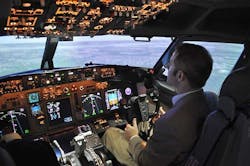Navy orders P-8A Poseidon flight simulators from Boeing for aircraft operations and weapons
Officials of the Naval Air Warfare Center Training Systems Division in Orlando, Fla., announced a $178.1 million contract last week to the Boeing Defense, Space & Security segment in Seattle to provide 16 operational flight trainers; 13 weapons tactics trainers; and four part task trainers for the P-8 aircraft.
An operational flight trainer is a flight simulator for general flight training. It has a motion platform in order to enable realistic instrument flying and other procedural training. A weapons tactics trainer also is a flight simulator that enables P-8 crews to practice mission profiles like deploying sonobuoys and torpedoes. A part task trainer, meanwhile, trains a member of the aircrew on a particular aircraft task.
The P-8 is a militarized version of the Boeing 737 single-aisle jetliner hardened for long-range maritime patrol and anti-submarine warfare (ASW) missions. It is scheduled to replace the Lockheed Martin P-3 Orion maritime patrol turboprop aircraft.
Related: Boeing to provide Navy P-8A Poseidon patrol jet flight simulators in $225 million contract
Navy officials plan to use the P-8A in tandem with the Northrop Grumman RQ-4N Triton Broad Area Maritime Surveillance (BAMS) unmanned aerial vehicle (UAV) -- a maritime-patrol version of the Global Hawk long-range surveillance UAV. Plans call for using BAMS to detect potentially hostile submarines and surface ships, and upon detection, to call in the P-8A to take a closer look or to attack hostile vessels with torpedoes and missiles.
The contract also calls for Boeing to provide a training systems support center and electronic classrooms located at Jacksonville Naval Air Station, Fla.; Whidbey Island Naval Air Station, Wash., as well as in Dallas and St. Louis. Jacksonville and Whidbey Island naval air stations are the primary bases for the Navy P-8 on the East and West coasts.
On this contract Boeing will do the work in St. Louis; Jacksonville, Fla.; Oak Harbor, Wash.; and Dallas, and should be finished by December 2018.
For more information contact Boeing Defense, Space & Security online at www.boeing.com/defense, or the Naval Air Warfare Center Training Systems Division-Orlando at www.navair.navy.mil/nawctsd.
